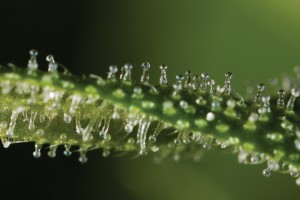Cannabis et cancer: Le Tétrahydrocannabinol (THC) et d’autres cannabinoïdes inhibent la croissance des tumeurs
En 2006, une étude publiée dans le British Journal of Cancer, menée par le Département de Biochimie et de Biologie Moléculaire à l’Université Complutense de Madrid a déterminé que le Tétrahydrocannabinol (THC) et d’autres cannabinoïdes inhibent la croissance des tumeurs.
L’Université était en charge de la première étude clinique visant à évaluer l’action antitumorale des cannabinoïdes. L’administration aux patients de cannabinoïde était sûre et a été réalisé avec zéro effets psychoactifs. Il a été validé que le THC avait réduit les cellules tumorales sur deux des neuf patients.
British Journal of Cancer (2006) 95, 197–203. doi:10.1038/sj.bjc.6603236www.bjcancer.com
Published online 27 June 2006A pilot clinical study of Δ9-tetrahydrocannabinol in patients with recurrent glioblastoma multiforme
M Guzmán1, M J Duarte2, C Blázquez1, J Ravina2, M C Rosa2, I Galve-Roperh1, C Sánchez1, G Velasco1 and L González-Feria2
- 1Department of Biochemistry and Molecular Biology I, School of Biology, Complutense University, Madrid 28040, Spain
- 2Department of Neurosurgery, Hospital Universitario de Canarias, La Laguna, Tenerife 38320, Spain
Correspondence: Professor M Guzmán, E-mail: mgp@bbm1.ucm.es; Professor L González-Feria, E-mail:lgferia@yahoo.es
Revised 15 May 2006; Accepted 5 June 2006
Advance online publication 27 June 2006
Abstract
Δ9-Tetrahydrocannabinol (THC) and other cannabinoids inhibit tumour growth and angiogenesis in animal models, so their potential application as antitumoral drugs has been suggested. However, the antitumoral effect of cannabinoids has never been tested in humans. Here we report the first clinical study aimed at assessing cannabinoid antitumoral action, specifically a pilot phase I trial in which nine patients with recurrent glioblastoma multiforme were administered THC intratumoraly. The patients had previously failed standard therapy (surgery and radiotherapy) and had clear evidence of tumour progression. The primary end point of the study was to determine the safety of intracranial THC administration. We also evaluated THC action on the length of survival and various tumour-cell parameters. A dose escalation regimen for THC administration was assessed. Cannabinoid delivery was safe and could be achieved without overt psychoactive effects. Median survival of the cohort from the beginning of cannabinoid administration was 24 weeks (95%confidence interval: 15–33). Δ9-Tetrahydrocannabinol inhibited tumour-cell proliferation in vitro and decreased tumour-cell Ki67 immunostaining when administered to two patients. The fair safety profile of THC, together with its possible antiproliferative action on tumour cells reported here and in other studies, may set the basis for future trials aimed at evaluating the potential antitumoral activity of cannabinoids.
Keywords:
cannabinoid; glioblastoma multiforme; pilot clinical study; antitumoral drug
Source: Nature.com

Commentaires récents